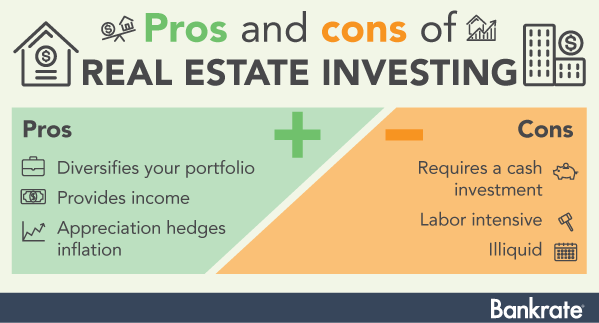Real estate investment, also known as property investment, involves the purchase, ownership, and management of a property to generate income or potential appreciation over time. While it can be a lucrative and rewarding venture, it’s essential to understand the pros and cons before diving in.
Pros of Real Estate Investment
1. Potential for High Returns
One of the primary advantages of investing in real estate is the potential for high returns. By leveraging the property’s value and using different financial strategies such as rental income and property appreciation, investors can earn significant profits.
2. Diversification
Real estate investment allows for diversification within an investment portfolio. By allocating a portion of your funds to real estate, you can reduce the overall risk of your investments and potentially increase returns by entering various markets.
3. Tangible Asset
Unlike other investment options like stocks or bonds, real estate offers the advantage of being a tangible asset. As a property owner, you can physically see and touch your investment, providing a sense of security and control.
4. Potential Tax Benefits
Investing in real estate can provide various tax benefits. Deductions for mortgage interest, property depreciation, repairs, and maintenance expenses can potentially lower your taxable income, resulting in reduced tax obligations.
Cons of Real Estate Investment
1. High Initial Costs
Real estate investment often requires a substantial initial investment. With property prices and associated costs such as property inspections, closing costs, and renovations, it may be challenging to enter the market without significant capital.
2. Lack of Liquidity
Unlike stocks or bonds, real estate investments are relatively illiquid. Selling a property can take time, and market conditions may affect the speed and price at which you can sell. This lack of liquidity can limit your ability to access funds quickly.
3. Management Responsibilities
Being a real estate investor entails management responsibilities. From finding and screening tenants to handling property maintenance and addressing any issues that may arise, it requires time, effort, and knowledge to effectively manage a property.
4. Market Volatility
Real estate markets can experience periods of volatility. Economic factors, interest rates, and local market conditions can significantly impact property values and rental demand. Investors must carefully analyze market trends and be prepared for potential fluctuations.
Conclusion
Real estate investment can be a profitable long-term venture with its potential for high returns and tax benefits. However, it also comes with upfront costs, management responsibilities, and the risk of market volatility. Assessing the pros and cons, conducting thorough research, and seeking professional advice can help investors make informed decisions in this field.

